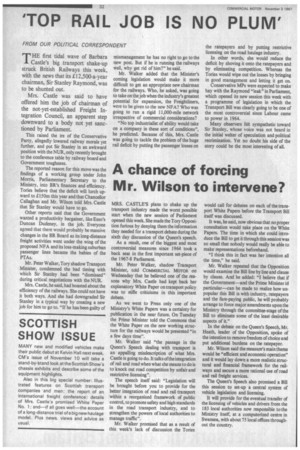A chance of forcing Mr. Wilson to intervene?
Page 34

If you've noticed an error in this article please click here to report it so we can fix it.
MRS. CASTLE'S plans to shake up the transport industry made the worst possible start when the new session of Parliament opened this week. She made the Tory Opposition furious by denying them the information they needed for a transport debate during the sixth day discussion of the Queen's speech.
As a result, one of the biggest and most controversial measures since 1964 took a back seat in the first important set-piece of the 1967-8 Parliament.
Mr. Peter Walker, shadow Transport Minister, told COMMERCIAL MOTOR Oil Wednesday that he believed one of the reasons why Mrs. Castle had kept back her explanatory White Paper on transport policy was to stifle criticisms in this important debate.
As we went to Press only one of the Ministry's White Papers was a certainty for publication in the near future. On Tuesday the Prime Minister told the Commons that the White Paper on the new working structure for the railways would be presented "in a few days time".
Mr. Walker said "the passage in the Queen's Speech dealing with transport is an appalling misdescription of what Mrs. Castle is going to do. It talks of the integration of rail and road when what she means to do is to knock out road competition by unfair and restrictive licensing".
The speech itself said: "Legislation will be brought before you to provide for the better integration of road and rail transport within a reorganized framework of public control, to promote safety and high standards in the road transport industry, and to strengthen the powers of local authorities to manage traffic".
Mr. Walker promised that as a result of this week's lack of discussion the Tories
would call for debates on each of the transport White Papers before the Transport Bill itself was discussed.
It was, he said, now obvious that no proper consultation would take place on the White Papers, The time in which she could introduce the Bill to get it through this session was so small that nobody would really be able to make representations beforehand.
"I think this in fact was her intention all the time," he said.
Mr. Walker repeated that the Opposition would examine the Bill line by line and clause by clause. And he added: "I believe that if the Government—and the Prime Minister in particular—can be made to realize how unpopular this Bill is with industry, ratepayers and the fare-paying public, he will probably arrange to force major amendments upon the Ministry through the committee-stage of the Bill to eliminate some of the least desirable aspects of it."
In the debate on the Queen's Speech, Mr. Heath, leader of the Opposition, spoke of the intention to remove freedom of choice and put additional burdens on the ratepayer.
Mr. Wilson said the measure's main theme would be "efficient and economic operation" and it would lay down a more realistic structural and financial framework for the railways and secure a more rational use of road and rail freight services.
The Queen's Speech also promised a Bill this session to set-up a central system of vehicle legislation and licensing.
It will provide for the eventual transfer of the licensing of vehicles and drivers from the 183 local authorities now responsible to the Ministry itself, at a computerized centre in Swansea, with about 75 local offices throughout the country.








































































































































